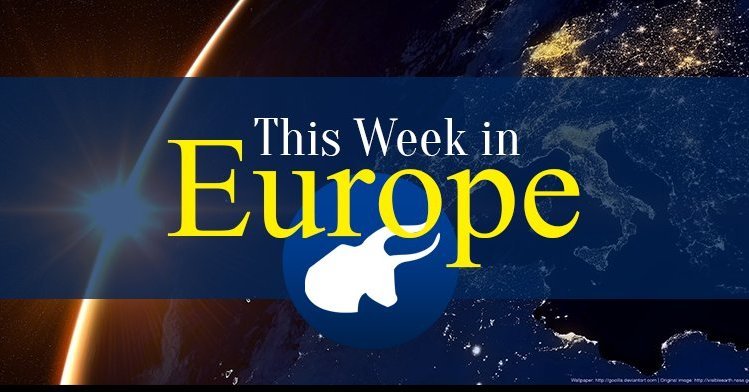France recalls ambassador to Italy
In a move not seen for decades, France recalled its ambassador to Italy this week, following a series of aggressive moves against France by the Italian government. The populist leaders in Italy, Di Maio and Salvini were already known to be no friends of Macron but over the last few weeks had broadened out their attacks to France and French policy in general (sometimes in ways that were not wholly coherent, such as the attacks on the CFA Franc - a common currency for some of France’s former colonies). The last straw came when Di Maio, who is likely trying to improve his party’s falling poll ratings compared to his coalition partner, came unannounced to France to meet some leaders of the Gilets Jaunes movement. While many have expressed concern at this deterioration in relations between two key European states, others have contended that this kind of dispute is evidence of the ‘Europeanization of the [EU]’s political space’.
German regulators crack down on Facebook’s near-monopoly
Germany’s antitrust office has ruled will have to gain users’ explicit consent when looking to combine data from different platforms owned by the company. Regulators were concerned at the way Facebook can bring together information from the multiple social media platforms that it owns (including WhatsApp and Instagram) in order to build detailed and unique profiles of its users. The fact Facebook has been able to develop its own social media platform and take over a number of other groups has given it immense power in the social media and data sectors. Facebook will look to appeal and will hope to argue that individual actions by Member State regulators undermine the efficacy of EU-wide data protection laws. If this fails then the company will have to comply with the request or face potential fines over €4 billion.
Measles cases tripled in Europe in 2017-18
A report from the WHO has found that the number of cases of measles grew substantially in Europe over the last two years, from 25,863 in 2017 to more than 82,000 in 2018. More than half of these cases were in Ukraine, where the Russian invasion led to a sharp drop in vaccination rates. Yet various countries have seen increases, notably in Italy where the growth of populist movements has been tied to the spread of anti-vaccination propaganda. The WHO has renewed efforts to better inform the public of the dangers of not vaccinating children but populists have undermined these efforts by spreading old and debunked conspiracy theories and attacking public trust in international organisations.
North Macedonia on road to NATO membership
North Macedonia signed the accession protocol with the current NATO members this week, meaning that the country is well on its way to joining the alliance. The end of the name dispute with Greece meant that North Macedonia’s accession was no longer blocked by the Greek veto, allowing the country to fulfill the long-standing desire to become a NATO member. The following day, Greece was the first country to formally ratify the protocol and each current NATO state will also have to ratify before North Macedonia is included in the alliance. Once the country joins NATO, North Macedonia will be the 30th member. Accession to NATO will provide further momentum to the country’s other big international objective: beginning the process of joining the European Union.
Poland’s first openly gay politician kicks off his campaign
This week, Robert Biedron, former mayor of Slupsk, has kicked off his campaign for both domestic and European elections taking place this year. He launched a new progressive party - “Spring” - that aims to challenge the governing conservative Law and Justice (PiS) party, currently at odds with the EU.
In a still deeply religious Poland, Biedron vowed to enforce the separation of church and state, promised equal pay for women, easy access to abortion, recognition of gay partnerships and generous social spending measures such as a universal old age pension. The former mayor also wants to close down all coal mines by 2035. Biedron’s party already has over 6% in the polls but remains far behind the PiS or the opposition liberal party Civic Platform (PO).
Eurosceptics drop “exit” plans after witnessing Brexit
As the confusing process of Brexit continues to unfold, it has had a surprising effect on Europe’s eurosceptics - many of them have dropped plans of leaving the Union. In Sweden, the far-right Sweden Democrats are no longer calling for an exit from the EU, after it was a pillar of their past program. Instead, the party’s leadership has opted for a “reform from the inside.”
In France, only minor party leaders such as François Asselineau (Union Populaire Républicaine) and Florian Philippot (Les Patriotes) are still advocating for France to leave the EU. In October 2018, a poll showed that 68% of Europeans believe that EU membership benefits them - the highest level since 1992.
France and Germany compromise on Nord Stream 2 gas pipeline
This week, France and Germany were at odds about the Russia-backed Nord Stream 2 pipeline. On Thursday, Paris stated that it was looking to promote a reform of the EU’s rules for the gas market through the so-called Gas Directive. The directive would have applied EU rules to the Nord Stream 2 pipeline, taking it out of the hands of Berlin and putting it in Brussels’. In the end, a compromise was reached and almost all member countries backed it.
The new regulation shifts responsibility for regulating pipelines coming to the EU from third countries to the country where such a pipeline lands — in Nord Stream 2’s case, Germany. US ambassador to Germany, Richard Grenell, published an op-ed in German media on Thursday, arguing to the blocking of the Nord Stream 2 project, seeing as the US itself wants a larger market for American liquefied natural gas. On the other hand, Poland has also taken the compromise between France and Germany as just another proof of how the two powers disregard the interests of their smaller neighbors.


Follow the comments: |
|
